This is a list of notable events in country music that took place in the year 1944.
"Someday You'll Want Me to Want You" is a popular song published in 1944 by Jimmie Hodges. The song became a standard, recorded by many pop and country music singers.
"You Don't Have to Be a Baby to Cry" is a song written by Bob Merrill and Terry Shand, and first recorded in 1950 by Moon Mullican.
Soldier's Last Letter is a country music song written by Redd Stewart and Ernest Tubb and recorded by Ernest Tubb. It was released in the United States in 1944.
"I Wonder" is a 1944 song written and originally performed by Pvt. Cecil Gant. The original version was released on the Bronze label, before Gant re-recorded it for the Gilt-Edge label in Los Angeles. The record made it to number one on the Juke Box Race Records chart and was Pvt. Gant's most successful release. In February 1945, pianist, Roosevelt Sykes hit number one with his version of the song. Roosevelt Sykes version is notable in that it replaced Pvt. Gant's version, at number one on the Juke Box Race Records chart.
"Rainbow at Midnight" is a novelty song written by Lost John Miller. The song originally made the Juke Box Folk chart when it was recorded by The Carlisle Brothers in 1946. "Rainbow at Midnight reached number five on the Juke Box Folk chart.
"Honey, Do You Think I'm Wrong" is a country music song written by Al Dexter and Frankie Marvin, performed by Al Dexter and His Troopers, and released on the Columbia label. In February 1946, it reached No. 2 on the folk chart. It spent eight weeks on the charts and was ranked as the No. 12 record in Billboard's year-end folk juke box chart. It was the "B-side" to "Guitar Polka" which peaked at No. 1.

"I Wish I Had Never Met Sunshine" is a country music song written by Gene Autry, Dale Evans, and Oakley Haldeman. It was sung by Gene Autry and released on the Columbia label. In May 1946, it reached No. 3 on the Billboard folk chart. It was also ranked as the No. 13 record in Billboard's 1946 year-end folk juke box chart.

"Wave to Me, My Lady" is a country music song written by William Stein and Frank Loesser, sung by Elton Britt, and released on the RCA Victor label. In March 1946, it reached No. 3 on the Billboard folk chart. It was also ranked as the No. 22 record in Billboard's 1946 year-end folk juke box chart.
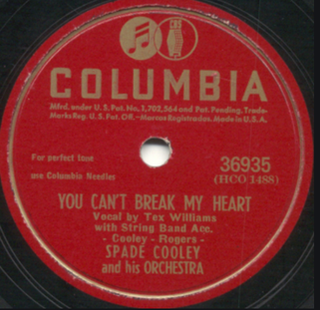
"You Can't Break My Heart" is a country music song written by Spade Cooley and Smokey Rogers, performed by Spade Cooley and His Orchestra, and released on the Columbia label. In April 1946, it reached No. 3 on the Billboard folk chart. It was also ranked as the No. 19 record in Billboard's 1946 year-end folk juke box chart.
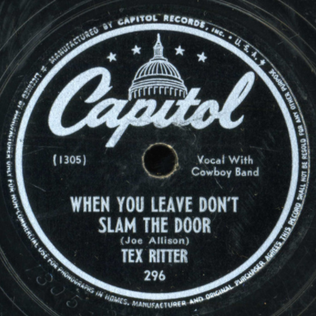
"When You Leave, Don't Slam the Door" is a country music song written by Joe Allison, performed by Tex Ritter, and released on the Capitol label. In October 1946, it reached No. 3 on the Billboard folk chart. It was also ranked as the No. 23 record in Billboard's 1946 year-end folk juke box chart.

"To My Sorrow" is a country music song written by Vernice J. McAlpin, sung by Eddy Arnold, and released in 1947 on the RCA Victor label. In November 1947, it reached No. 2 on the Billboard folk juke box chart. It was also ranked as the No. 12 record on the Billboard 1947 year-end folk juke box chart.
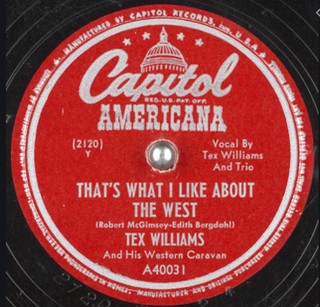
"That's What I Like About the West" is a song written by Edith Bergdahl and Robert McGimsey, performed by the Tex Williams, and released in 1947 on the Capitol Americana label. In October 1947, it peaked at No. 3 on the Billboard folk chart. It was also ranked as the No. 14 record on the Billboard 1947 year-end folk juke box chart.
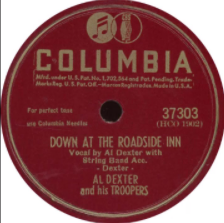
"Down at the Roadside Inn" is a song written by Al Dexter, performed by Dexter, and released in 1947 on the Columbia label. In May 1947, it peaked at No. 4 on the Billboard folk chart. It was also ranked as the No. 16 record on the Billboard 1947 year-end folk juke box chart.
The Billboard Most-Played Folk Records of 1946 is a year-end chart compiled Billboard magazine ranking the year's top folk records based on the number of times the record was played on the nation's juke boxes. In 1946, country music records were included on, and dominated, the Billboard folk records chart.

"Freight Train Boogie" is a country music song written by Alton and Rabon Delmore under the pseudonyms, Jim Scott and Bob Nobar. The song was recorded by The Delmore Brothers in Cincinnati. It was released in 1946 on the King label. In December 1946, it reached No. 2 on the Billboard folk chart. It was also ranked as the No. 30 record on the Billboard 1946 year-end folk juke box chart. Often the recording is regarded as one of the first Rock and Roll recordings.

"That's How Much I Love You" is a country music song written by Arnold, Fowler, and Hall, sung by Eddy Arnold, and released in 1946 on the RCA Victor label. In October 1946, it reached No. 2 on the Billboard folk chart. It was also ranked as the No. 10 record on the Billboard 1946 year-end folk juke box chart.
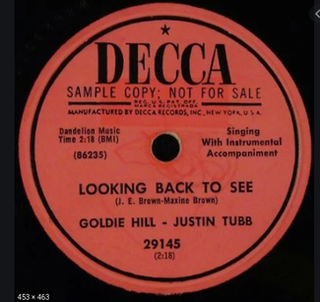
"Looking Back to See" is a song written and originally performed by Jim Ed Brown and Maxine Brown of The Browns. In June 1954, the Browns' version of the song reached No. 8 on the Billboard country and western chart.










